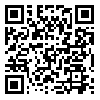Volume 6, Issue 4 (10-2013)
IJMEHM 2013, 6(4): 68-79 |
Back to browse issues page
Download citation:
BibTeX | RIS | EndNote | Medlars | ProCite | Reference Manager | RefWorks
Send citation to:



BibTeX | RIS | EndNote | Medlars | ProCite | Reference Manager | RefWorks
Send citation to:
Managheb S E, Hosseinpour M, Mehrabi F. Patient’s viewpoints about how to break bad news. IJMEHM 2013; 6 (4) :68-79
URL: http://ijme.tums.ac.ir/article-1-5184-en.html
URL: http://ijme.tums.ac.ir/article-1-5184-en.html
1- Department of Community Medicine, School of Medicine, Jahrom University of Medical Sciences, Jahrom, Iran
2- Student Research Committee, Jahrom University of Medical Sciences, Jahrom, Iran
2- Student Research Committee, Jahrom University of Medical Sciences, Jahrom, Iran
Abstract: (14076 Views)
Breaking bad news is an unavoidable part of the medical profession, and doctors and patients stand at the two sides of this function. There are different views about how to break bad news in different cultures and societies. In this study we assessed the viewpoints of hospitalized patients on how to break bad news.
This cross sectional study was performed in 2011 at the Jahrom University of Medical Sciences. Sample size of 110 patients was calculated and the method of sampling was simple random sampling. Target population was the hospitalized patients of Peymanyeh and Motahari hospitals in Jahrom. Entry criteria consisted of being admitted to the above hospitals, and exclusion criteria included severely ill patients and patients with mental disorders. A reliable self-administered questionnaire was designed and validated. The questionnaires were completed and returned by 110 patients. Data were analyzed using the SPSS16 software through descriptive analysis. One hundred and ten patients were included in this study. The factor analysis showed three elements: methods of breaking bad news, the people involved in the breaking bad news process, and timing and location. Of participants 78% wanted to be told the bad news while their relatives were present, 63.2% wanted to be told the bad news in a private and quiet room. Almost all respondents emphasized the need for religious advisors and psychological counselors (77.2% and 62.5% respectively). Most of participants (91.5%) wished to receive all the information about the etiology of their disease, and 74.8% of them wanted to be told whether their illness was cancer.This study showed that there are different views on how to break bad news in different cultures and societies. Social and cultural differences must be considered in breaking bad news. In our country, patients’ families could have a prominent supporting role in the delivery of bad news to patients.
Keywords: breaking bad news, medical ethics, communication skills, physician-patient relationship, truth
Type of Study: Research |
Subject:
Medical Ethics
Received: 2013/10/7 | Accepted: 2017/09/27 | Published: 2017/09/27
Received: 2013/10/7 | Accepted: 2017/09/27 | Published: 2017/09/27
Send email to the article author
| Rights and permissions | |
 |
This work is licensed under a Creative Commons Attribution-NonCommercial 4.0 International License. |





